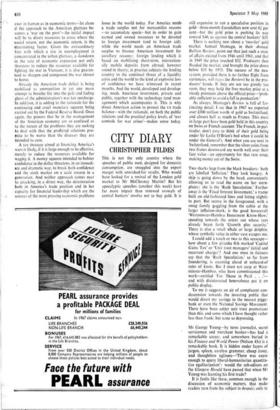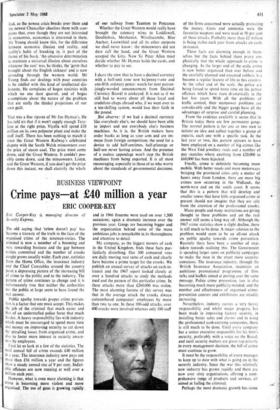CITY DIARY
CHRISTOPHER FILDES
This is not the only country where the speeches of public men, designed for domestic consumption, are smuggled into the export marget with unwished-for results. Who would have looked for a revival of the London gold market to Mr McChesney Martin? But his apocalyptic speeches (another this week) have far more impact than renewed avowals of central bankers' resolve not to buy gold. It is still expensive to run a speculative position in gold—three-month Eurodollars now cost 6 per cent—but the gold price is pushing its way toward $40, as against the central bankers' $35.
There is nothing new about a 'two-tier' gold market. Samuel Montagu, in their Annual Bullion Review, point out that just such a state of affairs existed from 1946 until 1961, and that in 1949 the price touched $52. Producers then flooded the market, and brought the price down below $35 by 1953. The success of the new system, provided there is no further flight from currencies, will (says the Review) be in the pro- ducers' hands. If they are not too greedy too soon, they may hold the free market price at a steady premium above the official price—'prob- ably sufficient to avoid a fall in production.'
As always, Montagu's Review is full of fas- cinating detail. I see-that in 1967 we exported over £300 million worth of gold to Switzerland, and almost half as muth to France. This must in large part have been gold held in this country on Swiss or French account. The French, in par- ticular, don't care to think of their gold being under Sir Leslie O'Brien's bed when it could be under the General's. And when you are next in Switzerland, remember that the silver coins from two francs downward are worth well over their face value—an opportunity for that rare coup, making money out of the Swiss.
Two sharks leap from the black breakers : both are labelled 'Inflation.' They look hungry. A ship is going down by the head, conveniently allowing us to read the -name on her stern- plates: she is the 'Rash Speculation.' Further away is the 'Fixed Interest Investment,' a tramp built on old-fashioned lines and listing slightly to port. But secure in the foreground, with a smug family goggling from the cabin at the larger inflation-shark, is the good hovercraft 'Westminster-Hambro Investment Know-How,' speeding towards the orient sun whose rays already beam forth 'Growth plus security.' There is also a small Ohale or large dolphin, whose symbolic value in either case escapes me.
I could add a touch or two to this seascape— how about a few piranha fish marked 'Capital Gains Tax' or 'Unit trust managers' initial and recurrent charges'? And one must in fairness say that the 'Rash Speculation,' so far from foundering, is steaming ahead at unheard-of rates of knots. But I must not carp at West- minster-Hambro, who have commissioned this work—entitled 'For Those in Peril . .
and with disinterested benevolence put it on public display.
To me it suggests an air of complacent con- descension towards the investing public that would divert my savings to the nearest piggy- bank or even the National Savings Movement. There have been odder unit trust promotions than this, and some which I have thought rather less than frank: but none so 'depressing.
Mr George Young—by turns journalist, secret serviceman and merchant banker—has had a remarkable career, and somewhere buried in his Finance and World Power (Nelson 45s) is a remarkable book. It is hidden under layers of jargon, spleen, careless grammar, cheap irony, and thoughtless ugliness—There was cause enough to query liberal-humanitarian quantita- tive egalitarianism': would the sub-editors on the Glasgow Herald have passed that when Mr Young was learning his first trade?
It is faults like these, common ,enough in the discussion of economic matters, that make readers turn from the subject in despair; only to
find, as the newest crisis breaks over them and the newest Chancellor chastises them with scor- pions that, even though they are not interested in economics, economics is interested in them. Mr Young should know this, for the difference between economic illusion and reality, and reality's habit of breaking in, is part of the theme of his book. 'An obsessive determination to maintain a universal Illusion about ourselves whatever the cost' was, he thinks, the 'germ that brought about the English sickness' and is now spreading through the western world. Mr Young finds our dealings with poor countries to be riddled with this kind of intellectual dis- honesty. He complains of bogus statistics with which no one dare quarrel, and of bogus assumptions about the nature of the problem that are really (he thinks) projections of our own guilt.
That was a fine riposte of Mr Joe Hyman's. He has told to that if it won't supply enough Tery- lene at the right price, Viyella will spend £10 million on its own polyester plant and make the stuff itself. There has been nothing to match it since the Great Western Railway's celebrated dispute with the South Welsh mineowners over the price of steam coal The price must come down, said the:Great Western. It couldn't pos- sibly come down, said the mineowners. Listen, said the Great Western, if you don't get the price down this instant, we shall electrify the whole of our railway from Taunton to Penzance.
Whether the Great Western would really have brought the catenary wires to Loddiswell, Doublebois, Menheniot, Wiveliscombe, Blue Anchor, Lostwithiel and all its other outposts we shall never know: the mineowners did not dare call the hand, and the Great Western scooped the kitty. Now Sir Peter Allen must decide whether Mr Hyman holds the cards, and whether to pay to see.
I share the view that to have a decimal currency with a half-unit (one new ha'penny=one and one-fifth ordinary pence: watch for next patron- isingly-worded announcement from Decimal Currency Board) is cockeyed. It is not as if we still had to worry about all those loyal and credulous chaps abroad who, if we went over to a ten-shilling system, would lose their faith in the pound.
,But observe: if we had a decimal currency like everybody else's, we should have been able to import and use everybody else's business machines. As it is, the British makers have order books as long as your arm and are im- mune from foreign competition; the need for a device to add half-centimes, half-pfennigs or half-sen never having arisen. And the presence of a useless appendage won't stop the British machines from being exported. It is all most encouraging, especially to those of us who worry about the standards of governmental decisions.







































 Previous page
Previous page